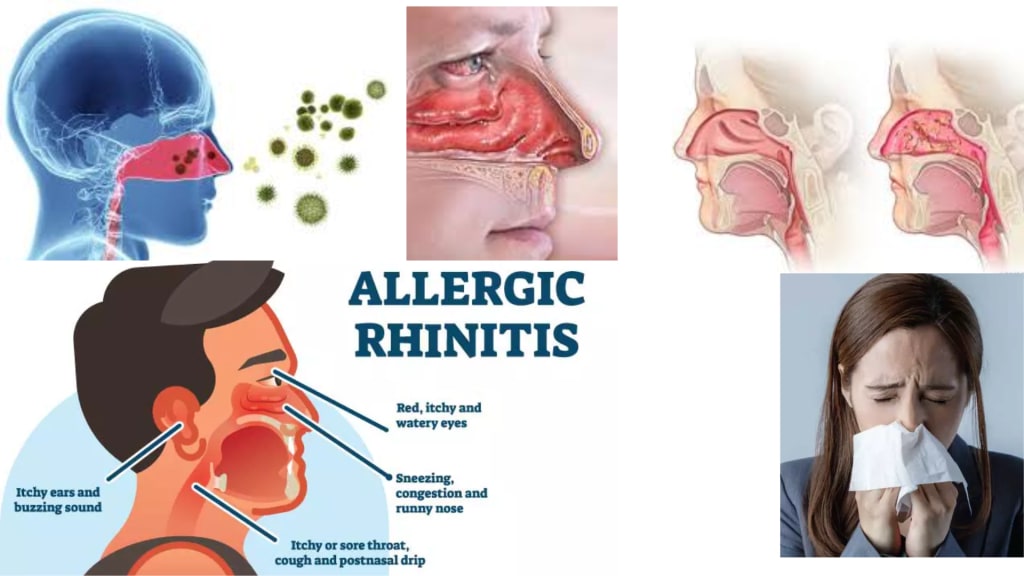Allergic Rhinitis (hay fever or seasonal allergy)
Ayurvedic Medicines to Treat Allergic Rhinitis

Understanding Allergic Rhinitis
Before delving into the Ayurvedic remedies, let's first understand the underlying causes and symptoms of allergic rhinitis. Allergic rhinitis is primarily triggered by allergens, which are substances that induce an allergic reaction. Common allergens include pollen, dust mites, pet dander, and certain foods. When a person with allergic rhinitis comes into contact with these allergens, their immune system overreacts, releasing histamines that cause inflammation and the characteristic symptoms of the condition.
What is an allergen?
An allergy is a reaction to a substance called an allergen. Common allergens include:
• Wind-borne pollen (from grass, trees, ragweed)
• Mold
• Dust mites
• Furry and feathered animals
• Pests, such as cockroaches or rodents in a home or other building
Normally allergens are harmless. But when a person has allergies, the body thinks these allergens are harmful. The body then attacks allergens with antibodies. Allergy antibodies are attached to special cells called mast cells. Allergens stick to the antibodies. This makes the mast cells release histamine and other chemicals. This is an allergic reaction. The chemicals irritate nearby nasal tissue. This causes nasal allergy symptoms. When this happens in the breathing tubes of the lungs, it can cause asthma symptoms such as cough and wheeze.
Ayurvedic Approach to Allergic Rhinitis
Ayurveda, the ancient Indian system of medicine, offers a holistic approach to treating allergic rhinitis. According to Ayurvedic principles, allergic rhinitis is caused by an imbalance in the body's doshas, namely Vata, Pitta, and Kapha. The goal of Ayurvedic treatment is to restore the balance of these doshas and strengthen the body's immune system to reduce the occurrence and severity of allergic reactions.
Ayurvedic Medicines to Treat Allergic Rhinitis
Allergic rhinitis, commonly known as hay fever, is a condition that affects a significant number of individuals worldwide. It is characterized by symptoms such as sneezing, runny nose, congestion, and itching of the nose, eyes, and throat. While there are various conventional treatments available, many people are turning to Ayurvedic medicines for a more holistic approach to managing allergic rhinitis. In this comprehensive guide, we will explore the best Ayurvedic medicines that can effectively treat allergic rhinitis and provide relief from its bothersome symptoms.
Best Ayurvedic Medicines for Allergic Rhinitis
1. Triphala: Triphala, a combination of three fruits, namely Amalaki (Emblica officinalis), Bibhitaki (Terminalia bellirica), and Haritaki (Terminalia chebula), is a popular Ayurvedic formulation known for its powerful antioxidant and anti-inflammatory properties. It helps strengthen the immune system and alleviate symptoms of allergic rhinitis.
2. Tulsi (Holy Basil): Tulsi is revered in Ayurveda for its numerous health benefits. It possesses strong anti-allergic, anti-inflammatory, and immunomodulatory properties. Consuming Tulsi leaves or Tulsi tea can provide relief from allergic rhinitis symptoms and enhance overall respiratory health.
3. Sitopaladi Churna: Sitopaladi Churna is a traditional Ayurvedic formulation that supports respiratory health. It consists of ingredients such as Pippali (long pepper), Vamshalochana (bamboo manna), and Ela (cardamom), which help relieve congestion, cough, and other respiratory discomforts associated with allergic rhinitis.
4. Haridra (Turmeric): Haridra, commonly known as turmeric, is a potent anti-inflammatory and immunomodulatory herb. Its active compound, curcumin, has been extensively studied for its therapeutic effects on allergic conditions. Consuming turmeric or incorporating it into your diet can help manage allergic rhinitis symptoms effectively.
5. Guduchi (Tinospora cordifolia): Guduchi is a well-known herb in Ayurveda that strengthens the immune system and reduces allergic reactions. Its immunomodulatory properties help regulate the body's immune response to allergens, preventing excessive histamine release and inflammation.
6. Shirish (Albizia lebbeck): Shirish is an Ayurvedic herb with potent anti-allergic and anti-inflammatory properties. It helps alleviate symptoms like sneezing, itching, and nasal congestion associated with allergic rhinitis. Incorporating Shirish into your daily routine can provide significant relief.
Incorporating Ayurvedic Medicines into Your Routine
To experience the maximum benefits of Ayurvedic medicines in treating allergic rhinitis, it is essential to incorporate them into your daily routine consistently. Here are a few tips to help you make the most out of these remedies:
1. Consult an Ayurvedic Practitioner: It is advisable to consult a qualified Ayurvedic practitioner who can assess your individual constitution and recommend the most suitable Ayurvedic medicines and therapies for your condition.
2. Follow a Balanced Diet: Maintain a healthy, balanced diet that includes fresh fruits, vegetables, whole grains, and herbal teas. Avoid processed foods, refined sugars, and excessive consumption of dairy products, which can aggravate allergic symptoms.
3. Practice Nasal Irrigation: Nasal irrigation with saline water or herbal decoctions can help clear the nasal passages and reduce congestion caused by allergic rhinitis. Use a Neti pot or a nasal spray for effective irrigation.
4. Keep Your Environment Clean: Minimize exposure to allergens by keeping your living space clean and dust-free. Regularly vacuum carpets, wash bedding in hot water, and avoid pets if you are allergic to animal dander.
5. Practice Stress Management: Stress can exacerbate allergic rhinitis symptoms. Incorporate stress management techniques such as yoga, meditation, and deep breathing exercises into your daily routine to promote overall well-being.
FAQ
What are 3 signs of allergic rhinitis?
Allergic rhinitis typically causes cold-like symptoms, such as sneezing, itchiness and a blocked or runny nose. These symptoms usually start soon after being exposed to an allergen.
What are the 2 types of allergic rhinitis?
There are two types of allergic rhinitis:
Seasonal: Symptoms can occur in spring, summer, and early fall. ...
Perennial: Symptoms occur year-round and are generally caused by sensitivity to dust mites, pet hair or dander, cockroaches or mold.
How long does allergic rhinitis last?
It clears up on its own after a few days for many people. In others, especially those with allergies, rhinitis can be a chronic problem. Chronic means it is almost always present or recurs often. Rhinitis can last for weeks to months with allergen exposure.
Conclusion
Ayurvedic medicines provide a holistic and natural approach to managing allergic rhinitis. By addressing the root cause of the condition and strengthening the body's immune system, these medicines can effectively alleviate symptoms and improve overall respiratory health. However, it is crucial to consult an Ayurvedic practitioner before starting any new treatment regimen. With consistent use of the recommended Ayurvedic medicines and adopting a healthy lifestyle, you can experience relief from allergic rhinitis and enhance your well-being.
About the Creator
bshadkumar
I am Shyam,
As a graduate from India and a software developer, some good things about me:
My combination of technical expertise, problem-solving skills, dedication, effective communication makes me a valuable software developer.






Comments
There are no comments for this story
Be the first to respond and start the conversation.